Should migrant workers learn the main lingua franca of a country before being allowed to take on a job? Although my own parents knew very little English when they first started working in New Zealand, and they learnt very little more after that, I have wondered whether there is a ring of truth in this statement. I have a Kiwi accent and as an English teacher by profession, I would like to believe that I am more tolerant of other people's linguistic difficulties when they have limited English skills.
On a recent trip to London, I went into a burger restaurant at Clapham Junction and asked the (Asian) attendant for a hamburger and some chips. She was having problems understanding me, so I repeated my order. I used all the synonyms for chips that I knew: potatoes, chips, french fries, fried potatoes. I was about to resort to Kiwi slang ('spuds') when she finally nodded and said "Yes, OK". When I went home with the takeaway bag, I found two burgers in it and no fries. I still can't work out what on earth it was that made me misunderstood. The end result was: no fried potatoes, that simple meal no one would make any health claims about, but very few would deny the mouth-watering, lip-smacking moreish taste of.
We all love fried potatoes at home, and it's a pity that it isn't the healthiest dish in our weekly range of meals. The only excuse I have to cook them more often is when I can disguise the platter with the addition of courgette and aubergine chips with garden-fresh produce.
Zucchini and eggplant can be sliced into very thin rounds, floured and dipped in very hot oil to make chips. I like to drain them on absorbent paper to get rid of the excess oil. They can be fried till they are very crisp, or just enough to keep their shape. In restaurants, they are usually served with a dollop of tzatziki or any other garlic flavoured dip.
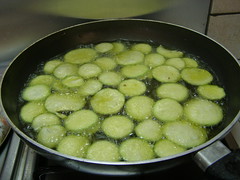
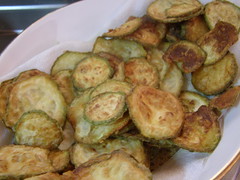
Aubergine is also made into a tasty soft squidgy fritter. I was very fortunate to pick up some albino eggplant from my uncles' farm the other day. White aubergine looks and feels exactly the same as purple aubergine, except that it has white skin. It tastes a little different: it has a much blander taste, bordering on sweet rather than savoury. This is why I never use it in papoutsakia or moussaka, because it isn't as tasty. As a fritter though, it is perfect.
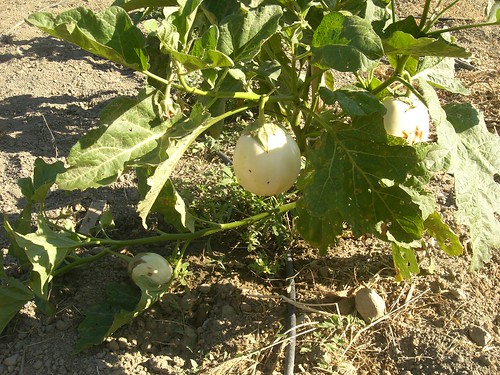
These fritters can be made with either purple or white aubergine. The best variety to work with is the round rather than the long eggplant. The peel needs to be removed from the aubergine before frying. It is as unpalatable as the skin of red Florinis peppers, whose skins are always removed after being roasted. In this case, slice the aubergine into rounds, and then pare the skin away from the aubergine flesh.

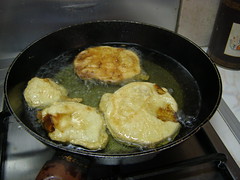
Dredge them in flour and dip them in a light batter so that they are just coated. Put them carefully into a pan with very hot oil; cook only a few at a time, because they tend to stick, and once the temperature of the oil is lowered if too many fritters are placed in the pan, they tend to soak up too much oil and become very greasy. Brown well on both sides.
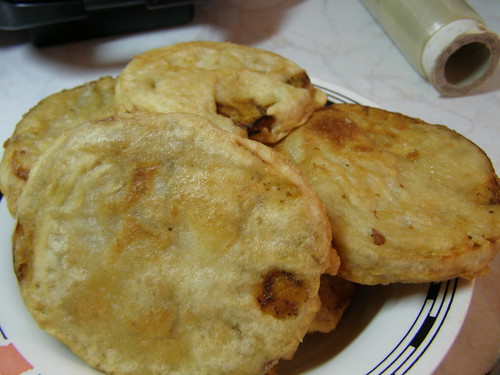
These delicious fritters only need a hefty summer salad to accompany them. Go easy on the bread, as there's plenty of flour covering them! For an even more tempting way to serve fried eggplant, have a look at Lulu's recipe which uses fresh tomato.
This is my entry for Weekend Herb Blogging, hosted this week by Srivalli from Cooking 4 All Seasons.
©All Rights Reserved/Organically cooked. No part of this blog may be reproduced and/or copied by any means without prior consent from Maria Verivaki.
We need to be understood when it comes to our stomachs:D
ReplyDeleteMaria, thats really a wonderful entry...thank you!
ReplyDeleteThe fritters were fried in glorious olive oil which gives them a wonderful flavor. I'd be most happy to serve them at my table - they're always one of the first things to go.
ReplyDeleteOh, I love zucchini made this way! Just look at that golden brown, crispy coating! You know, I've never had them with tzatziki, but I will now! I just happen to have both in my fridge! I've not seen the white eggplant before. I'll have to keep a look out for them as I'd sure like to try them. That last photo makes me want to reach through the screen and grab one! YUM!
ReplyDeleteMaria, here's the link to my fried eggplant (with a tomato sauce):
ReplyDeletehttp://mamastaverna.com/fried-eggplant-with-garlicky-tomato-vinegar-sauce-tiganites-melitzanes-me-skordo-kai-ntomata/
I'm STARVING right now. This wonderful post did not alleve that little problem at all. I need to go find something to eat!
ReplyDeleteLove frying my eggplant. I haven't come across white eggplant either.
ReplyDelete@ anonymous...obviously you have no idea how hard it is to cook for a family day in & out. Please don't use the word "lazy" unless you truly know what it means. It's cowardly to remain anonymous. Plus, you're killing the vibe. Move on...
Trehoun to salia mou. Fried eggplant and zucchini are real favorites of mine. I especially like them with tsatziki or just plain ol' yogurt. Sometimes I will grate kefalotiri on them. Your photos are wonderful. I can almost taste the food.
ReplyDeleteHope you and your family are having a great summer.
Hi Maria, I was pointed in your direction by Stavros, but had been lurking off and on for a while. Just to say that your site often makes my mouth water, and I admire your desire, so deftly executed, to reach us all through wonderful food. Your blog is beautifully set out, and informative, and I share your commitment to good ingredients, well cooked. Thanks for sharing your recipes so generously - I know a few people who would guard their cooking secrets with their lives.
ReplyDeleteMargaret
I think all those fritters look great. They look so fresh and tasty and non-greasy.
ReplyDeleteI make breaded eggplant fritters too, but I bake them :)
I grew lavendar eggplants last year, and while they were very productive, they weren't very flavorful. This was good in a way- I never had to soak them to reduce the bitterness. But they weren't good for strong-flavored things like baba ganoush.